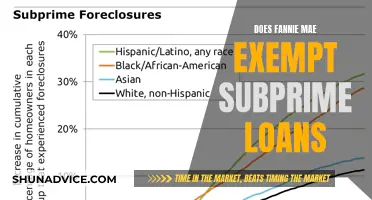
Bankruptcy and loan modification are two ways to relieve debt, but they are not mutually exclusive. In fact, bankruptcy can be a good way to tackle debt from a residential property after a loan modification. However, there are many factors to consider when deciding whether to file for bankruptcy before or after modifying a loan, such as the type of bankruptcy, the status of the loan modification, and the nature of the debt.
Does filing bankruptcy affect my loan modification?
| Characteristics | Values |
|---|---|
| Filing bankruptcy after loan modification | Can help tackle primary source of debt, i.e., residential property |
| Filing bankruptcy before loan modification | May affect ability to finalize the process |
| Filing Chapter 13 bankruptcy | Banks often look favorably on individuals as mortgage debt is regarded as primary debt |
| Filing Chapter 7 bankruptcy | Lenders will not negotiate to modify terms of the loan |
| Filing Chapter 7 bankruptcy | Trustee may decide to sell the property |
| Filing Chapter 13 bankruptcy | Reflected on the credit report and may impact the credit score |
| Filing Chapter 7 bankruptcy | No mechanism to help save a house when behind on payments |
| Filing bankruptcy | Can strip away second mortgage |
What You'll Learn

Chapter 7 bankruptcy
When it comes to loan modifications, Chapter 7 bankruptcy can have varying impacts. If you have already started the loan modification process before filing for Chapter 7, you may be required to restart the process by your lender. This is because lenders will typically stop negotiating and modifying loan terms until they receive authorisation from your attorney. In such cases, it may be beneficial to complete the loan modification process before filing for bankruptcy.
On the other hand, if you have not started the loan modification process and are already in Chapter 7 bankruptcy, you can still apply for a loan modification. Your lender may agree to modify the terms of your loan, but it is entirely at their discretion. They will likely want to ensure that the bankruptcy trustee has no interest in selling the property to benefit your creditors. Additionally, some mortgage companies may require a court order approving the modification before finalising the loan modification.
It is important to note that Chapter 7 bankruptcy does not provide a mechanism to save your house if you are behind on payments. If you are facing foreclosure, Chapter 13 bankruptcy may be a more suitable option as it allows you to catch up on past-due payments through a payment plan.
Lastly, reaffirmation agreements, which are legally binding contracts, may be presented by your mortgage company. Signing such an agreement waives the discharge you would have received in Chapter 7 and re-obligates you on the mortgage loan. Consult with a bankruptcy attorney to determine the best course of action for your specific situation.
Fannie Mae: Who Owns Your Mortgage?
You may want to see also

Chapter 13 bankruptcy
If you're facing foreclosure or are behind on your mortgage payments, you may be able to save your home through a Chapter 13 bankruptcy filing. This type of bankruptcy can help you catch up on your mortgage payments over three to five years and allow you to pay off other debts, like credit cards or medical bills, at the same time. Here's how Chapter 13 bankruptcy can affect your loan modification options and provide a path to keeping your home.
Fannie Mae's Role in Loan Origination
You may want to see also

Loan modification before or after bankruptcy
If you are a homeowner who is struggling with mortgage payments and are headed towards foreclosure, a mortgage loan modification should be considered to prevent the loss of your home. Many lenders offer programs to help homeowners apply for a loan modification. However, not all homeowners may find themselves with enough time to apply for a modification, and their other various debt issues may negatively impact the outcome of their applications.
In such cases, bankruptcy can assist homeowners in resolving their various debt issues while also pursuing a mortgage loan modification. Bankruptcy can work well with loan modification to provide relief for the homeowner. For instance, Chapter 13 bankruptcy often works as a loan modification in practice, and it is not unusual for a struggling homeowner to proceed with a further loan modification after filing for bankruptcy.
However, filing for Chapter 13 bankruptcy will be reflected on the filer's credit report and may impact their credit score. Additionally, during the 3-5 years period of the bankruptcy repayment plan, the borrower is prohibited from taking on any new credit without the approval of the Bankruptcy Court. This can make life difficult in emergency situations.
If you have started the loan modification process but it is not yet completed, you may wish to complete your home loan modification prior to filing for bankruptcy. If you file in the middle of modifying your home loan, during the trial payment period, for example, the lender may require you to restart the loan modification process. On the other hand, if you have not started the loan modification process, then you have the option to file for Chapter 7 bankruptcy and then start the process of loan modification while you are in bankruptcy. If your loan modification is approved while you are in bankruptcy, the mortgage company may require you to obtain a court order approving the modification before finalization.
It is important to consult with an experienced bankruptcy attorney to determine whether modifying your loan prior to filing for bankruptcy is in your best interest.
Factoring: Understanding Loan Factor and Its Impact
You may want to see also

Bankruptcy and loan modification working together
Bankruptcy and loan modification can work together to provide relief for homeowners. While filing for bankruptcy may affect an individual's ability to obtain a loan modification, it is not uncommon for a struggling homeowner to proceed with a loan modification after filing for bankruptcy. This is especially true for those who have significant debt other than their mortgage loan.
Loan modifications involve the voluntary agreement of the lender and bring the loan current again. Chapter 13 bankruptcy often works as a loan modification in practice, and banks often look favourably on individuals who file for it. This is because the mortgage debt will be regarded as a primary debt to be repaid, while other debts are given lower priority.
However, there are risks associated with filing for Chapter 13 bankruptcy. During the 3-5 years of the bankruptcy repayment plan, borrowers are prohibited from taking on any new credit without court approval. This can make emergency situations difficult to navigate. Additionally, Chapter 13 bankruptcy is reflected on the filer's credit report and may positively or negatively impact their credit score.
If an individual has started the loan modification process but has not completed it, they may wish to finalise the loan modification before filing for bankruptcy. This is because, in some cases, filing for bankruptcy in the middle of the loan modification process may cause the lender to require the borrower to restart the process.
It is important to note that the decision to file for bankruptcy or modify a loan depends on the specific circumstances of each case. Consulting with an experienced attorney is crucial in helping individuals make the right choice for their situation.
Fannie Mae: Who Really Owns Your Mortgage Loan?
You may want to see also

Bankruptcy and loan modification separately
Bankruptcy
Bankruptcy is a legal process that allows individuals or businesses to resolve their debt issues and get a fresh financial start. There are different types of bankruptcy, with Chapter 7 and Chapter 13 being the most common for individuals.
Chapter 7 bankruptcy is a quick process that usually wipes out debt within a few months. However, it does not allow individuals to keep property that they would otherwise lose due to missed payments. During Chapter 7 bankruptcy, lenders are temporarily stopped from attempting to collect missed payments or proceeding with foreclosure.
Chapter 13 bankruptcy, on the other hand, allows individuals to propose a repayment plan to the court and make monthly payments over a period of three to five years. This type of bankruptcy can help individuals catch up on certain payments, modify secure debt, and reorganize their finances. It is often used to stop foreclosure and modify the terms of a loan, such as adjusting the interest rate or adding missed payments to the end of the mortgage.
Loan Modification
Loan modification is a process where the lender agrees to change the terms of the loan. This can include lowering the interest rate or monthly payments to make the loan more affordable for the borrower. It is often considered when individuals are struggling to make their mortgage payments and are facing foreclosure.
The loan modification process can be arduous and exhausting, requiring borrowers to submit extensive documentation to the lender. There is no guarantee that the modification will be approved, and lenders may require additional information or for the process to be restarted. However, loan modification can be a good solution for homeowners struggling with their mortgage repayment, providing relief without the need to file for bankruptcy.
FedLoan Rehabilitation: What Are Your Options?
You may want to see also
Frequently asked questions
Filing for bankruptcy does not kill your chances of loan modification. In fact, loan modification and bankruptcy can work together to provide relief for the homeowner. However, it is important to note that the order in which you do this may be important, and this differs on a case-by-case basis. Consult an attorney to discuss your options.
If you have already started the loan modification process, filing for bankruptcy may affect your ability to finalize the process. Lenders will not negotiate to modify the terms of your loan when there is a pending bankruptcy. However, if you have not started the loan modification process, you can file for bankruptcy and then start the process of loan modification.
Bankruptcy will be reflected on your credit report and may positively or negatively impact your credit score. A bankruptcy will remain on your credit report for 7-10 years.
Chapter 13 bankruptcy often works as a loan modification in practice. It allows you to keep your property and pay off your debts through a 3-5 year repayment plan. Chapter 7 bankruptcy does not have this mechanism to help you save your house.
Bankruptcy can strip away a second mortgage by reclassifying it as an unsecured loan, which can then be negotiated to be paid at a much lower amount.







